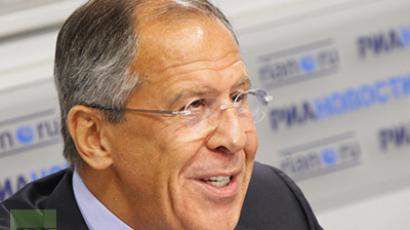US political infighting threatens America-Russia reset

Following a Republican surge in the jungle of US politics, President Barack Obama’s hopes for a nuclear-free world and better relations with Russia appear to be fading fast.
After eight painful years of watching George W. Bush’s “War on Terror” crash across an unsuspecting planet, Barack Obama’s hopeful vision of a “world without nuclear weapons,” as well as a long-awaited “reset” in relations with Russia was a welcome change. Indeed, the message filled the world with so much hope and euphoria that it got Obama awarded a Nobel Peace Prize – even as US soldiers were bogged down deep in the Middle East, and the Guantanamo Bay detention facility was (and still is) open for business.Now, many observers are kicking themselves for falling under the mesmerizing spell of Obama’s candy-coated speeches, while failing to give due consideration to the vicious nature of the Democrat’s political opponents. Indeed, it is not beneath the Republicans to hold a nuclear weapons treaty hostage to the whims of political gamesmanship.The new strategic arms reduction treaty, known as New START, was signed in April amidst much fanfare by President Obama and Russian President Dmitry Medvedev. The treaty, which replaces the now-expired Strategic Arms Reduction Treaty of 1991, mandates that each country would limit their nuclear arsenals to 1,500 warheads. A world without nuclear weapons, remember? Well, the “Party of No”, as the Republican Party has rightly been dubbed, never got the memo, it seems.Now, with the Democrats limping in a lame-duck session of Congress, the Republicans smell blood, and their long-term goal of thwarting Obama’s hopes of a two-term presidency seems to be the only political program they have left. Despite the Democrat’s offer to bankroll an additional $4 billion to modernize America’s existing nuclear arsenal, Senator Minority Whip Jon Kyl (R- Ariz.) said, sorry, that just wasn’t enough.“When Majority Leader Harry Reid asked me if I thought the treaty could be considered in the lame duck session, I replied I did not think so given the combination of other work Congress must do and the complex and unresolved issues related to START and modernization,” Kyl said in a statement Tuesday.While some political analysts interpreted Kyl’s comment as an effort to get the Democrats to crack open the public purse even wider, others saw it as part of the Republican strategy to ensure that Obama would be calling the movers to Pennsylvania Avenue in 2012.US Vice-President Joe Biden fired back at the Republican broadside that failure to ratify New START with Russia could threaten America’s national security.“The New START treaty is a fundamental part of our relationship with Russia,” Biden told reporters yesterday, “which has been critical to our ability to supply our troops in Afghanistan and to impose and enforce strong sanctions on the Iranian government.”Whether the Democrat’s argument in favor of national security will prove enough to persuade the Republicans to ratify New START remains to be seen.Now entering NATO countryThe next surprise that may roll the already wobbly US-Russian apple cart involves America’s nuclear missiles in Europe, which, in light of Obama’s dream of a nuclear-free world many were expecting to be shelved at the upcoming NATO Summit in Lisbon.But according to a leaked document allegedly obtained by the Guardian, the British daily, there is no mention of eliminating nuclear weapons on the European continent. “In the latest draft of NATO's "new strategic concept", the Guardian reported on Wednesday, “nuclear weapons remain at the core of NATO doctrine, and an attempt to withdraw an estimated 200 American B-61 nuclear bombs from Europe, a legacy of the cold war, is not mentioned.“Germany, the Netherlands and Belgium – who all have B-61 bombs on their soil – had pushed to have the tactical weapons removed, with the encouragement of supporters of disarmament in the Obama camp including the US ambassador to NATO, Ivo Daalder,” the paper said.Yes, Obama may have had a dream, but that doesn’t mean we should have expected it to crystallize into something real and tangible. After all, that would have required something known as a backbone, an essential political thing that was somehow ripped from the body of the Democratic Party when they weren’t looking.Russia, however, conditioned as it is to American shock-and-awe tactics courtesy of the Bush-era neocons, was never really expecting the US to pack up their nukes from Western Europe. Of course the gesture would have been appreciated, but Russians are probably the most realistic people on the planet.What will really get the Russians to sit up and take notice more than anything – besides, God forbid, NATO offering Georgia membership in the 28-nation bloc – is if the question of Russian participation in the US missile defense system in Eastern Europe should go unanswered at the NATO summit.Indeed, how NATO and, more importantly, the United States agrees to co-operate with Russia on the development of this advanced system will reveal exactly how “democratic” the Cold War military structure really is, as well as revealing Uncle Sam’s cards when it comes to relations with Russia. In other words, is the United States calling most of the major shots inside of NATO, or do the European capitals enjoy some sort of vetoing process?Moscow, with much apparent justification, argues that a US-built missile defense system smoking on its doorstep would throw off the nuclear balance. Indeed, without some sort of major concessions given to Russia over this system, the question of the New START treaty would rather quickly become a moot issue. In other words, Russia would hardly be willing to slash its nuclear missile stockpiles at a the same time that the United States is dotting former Warsaw Treaty real estate with a missile defense system. What gladiator would accept a shorter sword at the same time his opponent is reaching for a larger shield?Incidentally, if Washington was hoping that Russia would welcome with open arms the “Obama-lite” version of the system, introduced after Barack Obama scrapped the Bush model, it was sadly mistaken. In fact, Russia seems even more apprehensive about the new technology, the Aegis Ballistic Missile Defense System (Aegis BMD), than the older Bush version. According to Lockheed Martin, the developer of the technology, on its website, “Lockheed Martin recently demonstrated the second generation of its Aegis Ballistic Missile Defense (BMD) capability in a formal US Navy test event.”“This configuration, known as Aegis BMD 4.0.1, enables the US Missile Defense Agency (MDA) and the Navy to defeat more complex ballistic missile threats and also introduces the BMD signal processor, which improves target identification.Aegis BMD 4.0.1 marks the beginning of the transition to the Navy’s open architecture – a transition that will be complete with software upgrades, known as Advanced Capability Build 12, scheduled for 2012.”In addition to the ability of this defense system to evolve technologically, it may also expand in terms of the territory it can cover. Indeed, analysts have expressed the concern that such technology may eventually “surround” Russia in a band of radars and launch pads.The Lockheed Martin website goes on to speak of its expansion plans, which already include Japan, which, it might be added, is presently at loggerheads with Russia over the disputed Kuril Islands. “Currently, a total of 23 Aegis BMD-equipped warships – 20 in the Navy and three in the Japanese Maritime Self-Defense Force – have the certified capability to engage ballistic missiles and perform long-range surveillance and tracking missions. 12 additional ships have been identified for modification to perform ballistic missile defense in the next 36 months.The Strategic Concept, NATO's first mission statement to be released in more than a decade, will be unveiled at a gathering in Lisbon that alliance Secretary General Anders Fogh Rasmussen has called "one of the most important summits in the history of our alliance." Russian President Dmitry Medvedev will attend the first summit-level meeting of the NATO-Russia Council, where all of these extremely sensitive issues will sure to be given ample consideration.With any luck, the US Republicans will not seek a short-term political victory by derailing a long-term reset between the United States and Russia. The international community, which was captivated by the specter of the Cold War for many decades, has waited too long for this moment already.Robert Bridge, RT
For more, watch RT's interview with Viktor Kamyshanov, President of Federation for Peace and Conciliation














